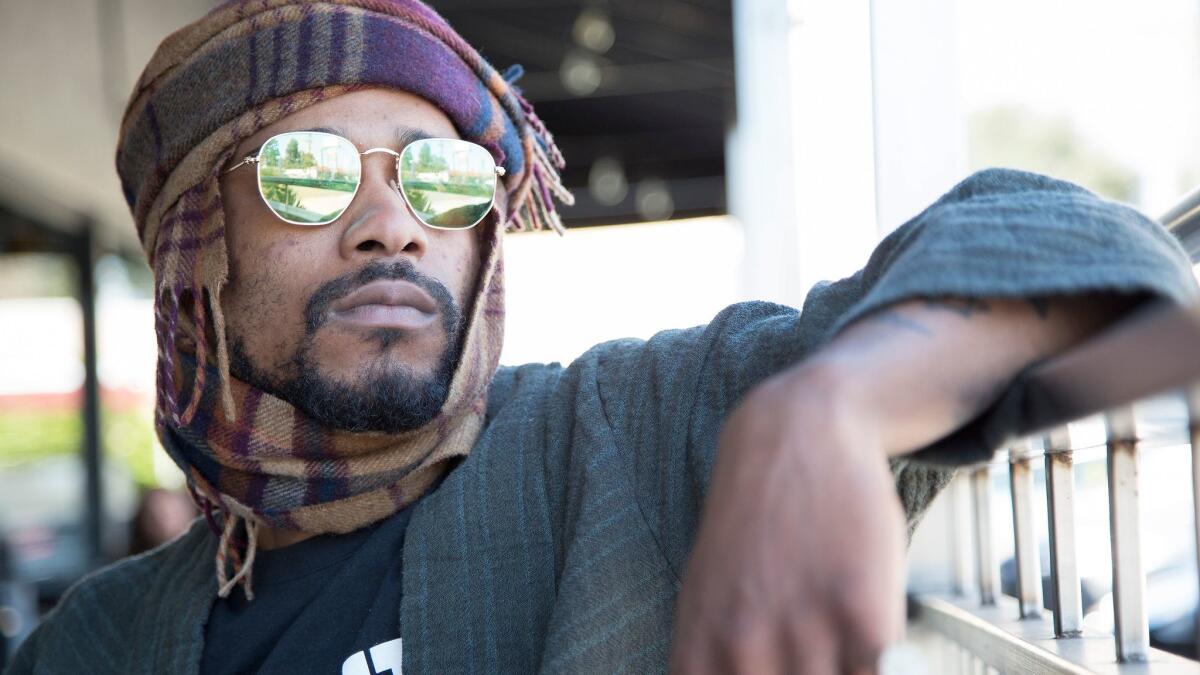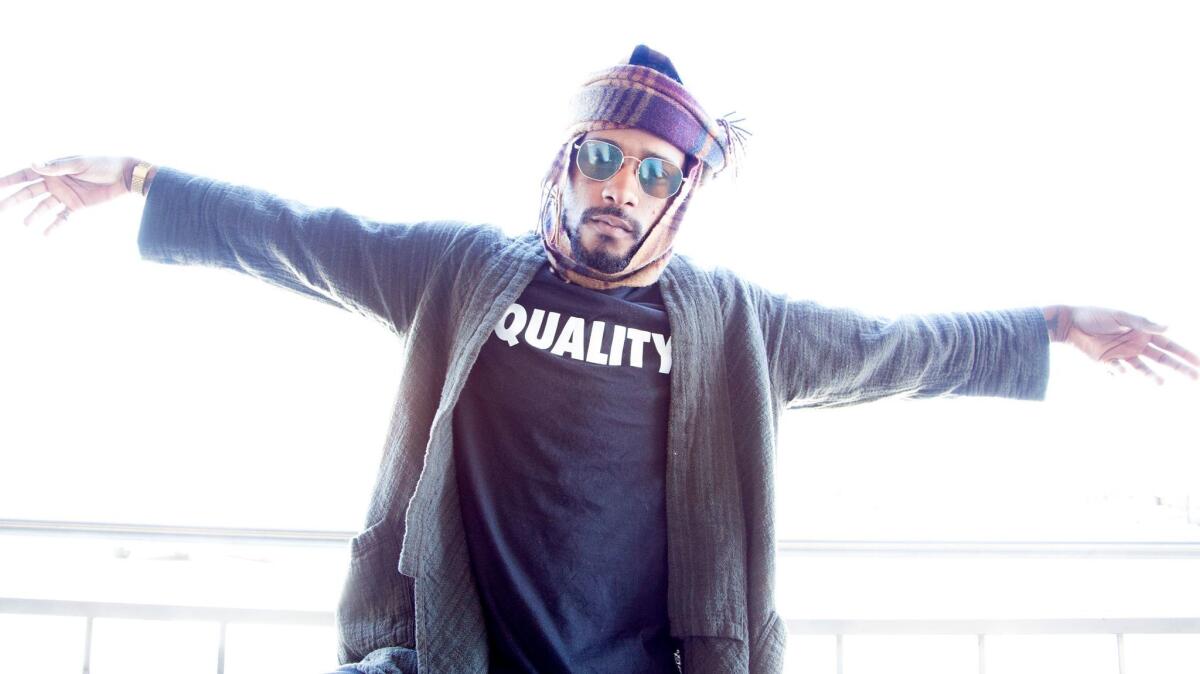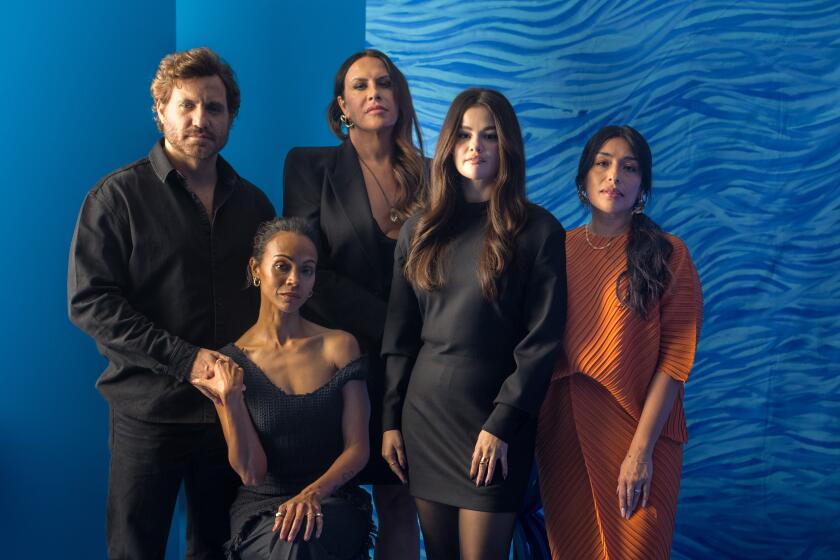Lakeith Stanfield on ‘Get Out,’ ‘Atlanta’ and working at a marijuana factory

Most actors can’t credit a police raid at a marijuana factory for jump-starting their leap into acting, but then again, most actors aren’t Lakeith Stanfield.
The Victorville native, whose career trajectory has also included a brief stint as a runway model, was working at the factory (“I don’t know why I’m always saying it was a factory, it was like a house with the walls knocked out of it,” he admitted) for about six months before a SWAT team swarmed in and crashed the whole operation.
“It was like I lost my baby or something,” he said. “It sucked because I thought I was going to be doing that for the rest of my life. I was like, ‘I love this. I want to just keep raising plants.’ And it just stopped right there. So I had to move, figure out my life, and I somehow started this trajectory.”
(Warning: Spoilers for “Get Out” below.)
The 25-year-old, who made his film debut in 2013’s “Short Term 12,” has since nabbed bit parts in buzzy movies like “The Purge: Anarchy,” “Selma,” “Dope,” and “Straight Outta Compton” where he played Snoop Dogg, no less. Most recently (and most memorably), he appeared in Jordan Peele’s “Get Out” as Logan, the unfortunate victim of a suburban body-snatching operation. And he’s a series regular on Donald Glover’s award-winning FX comedy “Atlanta.”
Meeting Stanfield in person is kind of like coming face-to-face with Darius, the character he plays on “Atlanta.” He has a quiet intensity, and is as quick to laugh as he is to wax poetic on racial inequality in Hollywood or the consciousness of plants. Swathed in a brown wool scarf despite the near 80 degree L.A. heat, Stanfield explained what it was like working on projects like “Get Out” and “Atlanta.”
‘Get Out’ was fun and cool, but it was creepy. It was genuinely scary for me to do. ‘Atlanta’ was like a beautiful, brilliant, fun journey with friends.”
— Lakeith Stanfield
“‘Get Out’ was really fun and cool, but it was creepy,” he said. “It was genuinely scary for me to do. ‘Atlanta’ was like a beautiful, brilliant, fun journey with friends. I felt weirdly with ‘Get Out’ like I was doing something for the culture but with ‘Atlanta,’ it was more so like, ‘Let me invite you into my home and show you how I live.’ And it ended up still feeling at the end of the day like [it was for the culture].”
That culture being black culture, which is growing steadily in popularity despite black people being told for years that their narratives wouldn’t sell. Among the buzziest new shows of 2016 were “Atlanta,” Issa Rae’s “Insecure,” and Ava DuVernay’s “Queen Sugar,” shows that center around black people just living their lives; universal stories that are increasingly being sopped up by multiracial audiences.
“I think now we’re coming through and beginning to see that humanity isn’t dictated by ethnicity and background. We’re just human first,” Stanfield said. “So it’s an exciting time for me because I’ve always felt human but trapped in a body that made people believe things about me that simply weren’t true. Now we get to express ourselves and live in that way with projects like ‘Get Out,’ with projects like ‘Atlanta.’ We get to just humanize the black male in Hollywood’s racial structure. Hollywood’s been racist since its inception. But now it’s opening up. Now it’s becoming much more real, inclusive.
“I want to be what I didn’t have, which is a role model, a male person on TV that looked like me that was able to do cool things,” Stanfield added. “I also want to be able to do that and just more humanize myself … because you’d be surprised how much people think your skin tone actually indicates something about you.”
Darius’ one-liners (one gem: “You assume perversion of the word ‘daddy.’ I think that’s stemming from a fear of mortality”) and obvious comfort in his own offbeatness allow him to steal any scene he’s in.
“Lakeith makes Darius a real person,” Glover said. “I saw him in ‘Short Term 12’ and thought he was really captivating and quietly funny. We have a very collaborative relationship. He just makes decisions on camera that I really believe and love. It’s really fun and natural.”
Brian Tyree Henry, who plays rapper Paper Boi on the show and is Stanfield’s most frequent scene partner, recalled that, “From the very first moment I met Keith on the pilot, I knew right away that we were connected. He is truly my little brother. Our characters really reflect our actual friendship.”
Most importantly to Stanfield, his character gives people watching an example of cool that deviates from traditional archetypes.

I’m pretty sure everyone involved with ‘Atlanta’ to some extent has gotten bullied or told that they weren’t going to be able to do something...”
— Lakeith Stanfield
“I’m pretty sure everyone involved with ‘Atlanta’ to some extent has gotten bullied or told that they weren’t going to be able to do something or that they weren’t cool at some point in their life,” Stanfield said. “And now those same people are leading the revolution of television because they’re so tired of having that gaze on them telling them what they are and having other people’s perceptions move them.
“I think that’s what attracted a lot of people [to the show], because a lot of people identify with not being comfortable in their skin or not thinking you’re good enough. Especially kids in high school. Now they have people to look up to who also weren’t ‘good enough.’”
In “Get Out,” Stanfield plays Logan, the unwitting victim of a suburban white family that’s perfected the art of body-snatching (specifically, black bodies). The film, a low-budget horror satire that turned into the year’s breakout hit, explores themes involving (literal) cultural appropriation, micro-aggressions experienced by black people at the hands of whites, and the thorniness of race relations, among other things.
“I’ve seen it like four times now,” Stanfield said. “Literally the third time I saw it, I was walking out shaking. It hit me deep that time.”
“Get Out” director Peele notes in an email that “Every moment Lakeith is on screen the audience has his back. For the opening scene, I needed the audience to feel like this could happen to any one of us. Lakeith has this woke and wise quality. We trust him to make the right call; the same call we would make.”
Still, Logan was outside Stanfield’s usual onscreen persona. “Lakeith, stripped of his cool, is a creepy thing,” Peele said.
The low-budget film has turned into the year’s most surprising hit, but not everyone was happy with the film.
“I saw a couple of people walk out,” Stanfield said. “People were feeling some type of way which I thought was good because first of all, you bought a ticket, so thanks. But I think it’s good that people feel something. If it makes you feel something, whether it’s good or bad, then good.”
In “Get Out,” after having his brain swapped with that of an older white man, Logan began to take on the mannerisms of a septugenarian, a performance Stanfield admitted he didn’t have to study for.
“I interact with white people all day, every day,” he said. “So really it just required me keeping my eyes open. I’m constantly interfaced with not only white people but the disposition of one that is seemingly benign but really has ulterior motives. Living in Hollywood I deal with that every day.”
All this talk about race and inequality was clearly troubling to Stanfield. He brightened up, though, when asked about why he decided to become an actor.
“I was just talking about that earlier,” he said. “I was wondering what was the turning point. And Xosha [his girlfriend] said, ‘You were born like that. You’ve always been like that.’ And it really hit me for some reason because I don’t really think of a time where a switch came or I was like, ‘I wanna do this.’ I just always was that type of person that you probably would want to film or something. I think if it wasn’t for acting, I would probably be one of those dudes on the side of the road.”
follow me on twitter @sonaiyak
ALSO:
Jordan Peele on how ‘Get Out’ defied the odds to become a full-blown cultural phenomenon
Jordan Peele’s clever horror-satire ‘Get Out’ is an overdue Hollywood response to our racial anxiety
How Allison Williams mined the horrors of white privilege for ‘Get Out’
More to Read
Only good movies
Get the Indie Focus newsletter, Mark Olsen's weekly guide to the world of cinema.
You may occasionally receive promotional content from the Los Angeles Times.











